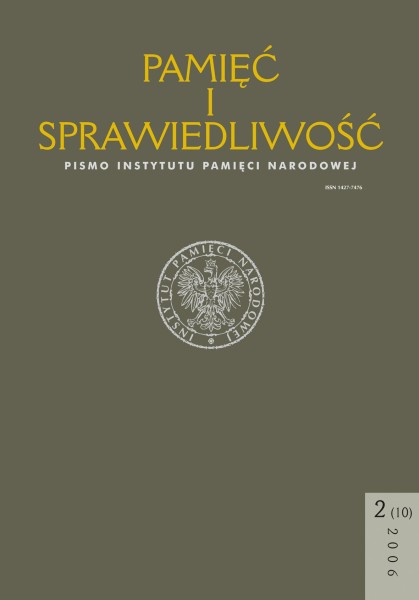Operacja „Olcha”. Władysław Bartoszewski, Radio Wolna Europa i Służba Bezpieczeństwa
Pamięć i Sprawiedliwość, Tom 10 Nr 2 (2006), strony: 115-142
Data publikacji: 2006-12-30
Abstrakt
The author reconstructs one of the largest operations undertaken by the Security Service in sixties. It was a part of various activities of communist authorities to limit contacts of Polish citizens with the West and Polish emigration. On of the most fiercely fought enemies was Radio Free Europe, which was successfully breaking the information monopoly of the Polish communist authorities.
In 1963 Władysław Bartoszewski, who during the war was an AK (Home Army) soldier and activist of Council to Aid the Jews, and during the stalinism period was imprisoned for many years, began conspiracy co-operation with Radio Free Europe. With a group of co-operators (who were also ex-AK soldiers) he regularly passed to Munich information about situation in Poland – repressions and harassment against the intellectuals, Church,
opposition. This information was the basis of numerous important programmes of Radio Free Europe. SB found the traces of his activities in 1966, using the bug information and intelligence sources. Bartoszewski and his co-operators were kept under meticulous surveillance for many years, SB tried to intimidate them, enrol for co-operation, isolate in their environments. Help of Stasi and KGB was used. The most important aims of Security
Service was to discover „transfer channels” (ways of passing the information from Poland abroad) and to fi nd evidence which would allow to sue Bartoszewski. They succeeded only in 1970, when his co-operators: Stanisław Salmonowicz, Danuta Bańkowska, Ewa Dreżepolska were arrested. Władysław Bartoszewski was questioned many times and the Service tried to enrol him. After his fl at refusal, the Service used their net of secret agents to spread rumours and forged documents, which were to discredit Bartoszewski as a professed agent of Ministry of Interior. Simultaneously a lawsuit, which was to be a propaganda blow against Radio Free Europe, was being prepared. These plans were ceased only after dramatic events in Gdynia, Gdańsk and Szczecin in December 1970 and changes on the authorities’ top. New Gierek’s team, who wanted to present their „liberal” face
withdrew plans for lawsuit and released the three arrested people. Nevertheless they were still, together with Bartoszewski, subject to harassment and surveillance. Bartoszewski continued his co-operation with Radio Free Europe.
Inne teksty tego samego autora
- Jerzy Eisler, Andrzej Friszke, Paweł Machcewicz, Andrzej Paczkowski, Janusz Wrona, [Dyskusja] PKWN – próba oceny , Pamięć i Sprawiedliwość: Tom 8 Nr 2 (2005)
- Sławomir Łukasiewicz, Paweł Machcewicz, Paweł Sasanka, Paweł Ziętara, Rok 1956 - 60 lat później. Dyskusja z udziałem Sławomira Łukasiewicza, Pawła Machcewicza, Pawła Sasanki, Pawła Ziętary , Pamięć i Sprawiedliwość: Tom 28 Nr 2 (2016)
- Paweł Machcewicz, Grzegorz Motyka, [Recenzja] W odpowiedzi Frankowi Grelce , Pamięć i Sprawiedliwość: Tom 6 Nr 2 (2004)
- Edmund Dmitrów, Antoni Dudek, Andrzej Friszke, Paweł Machcewicz, Andrzej Paczkowski, Jerzy Józef Wiatr, [Dyskusja] Polityka wobec historii, historiografia wobec polityki: PRL i III Rzeczpospolita , Pamięć i Sprawiedliwość: Tom 1 Nr 1 (2002)
- Paweł Machcewicz, Droga do Norymbergi. Geneza sądowych rozliczeń ze zbrodniami III Rzeszy , Pamięć i Sprawiedliwość: Tom 25 Nr 1 (2015)
- Paweł Machcewicz, Prokop Tomek, [Recenzja] Paweł Machcewicz, „Monachijska menażeria”. Walka z Radiem Wolna Europa 1950–1989, Instytut Pamięci Narodowej, Instytut Studiów Politycznych PAN, Warszawa 2007, ss. 444 , Pamięć i Sprawiedliwość: Tom 14 Nr 1 (2009)
 Język Polski
Język Polski
 English
English
 Deutsch
Deutsch
 Français (France)
Français (France)
 Italiano
Italiano
 Русский
Русский


 PDF
PDF
